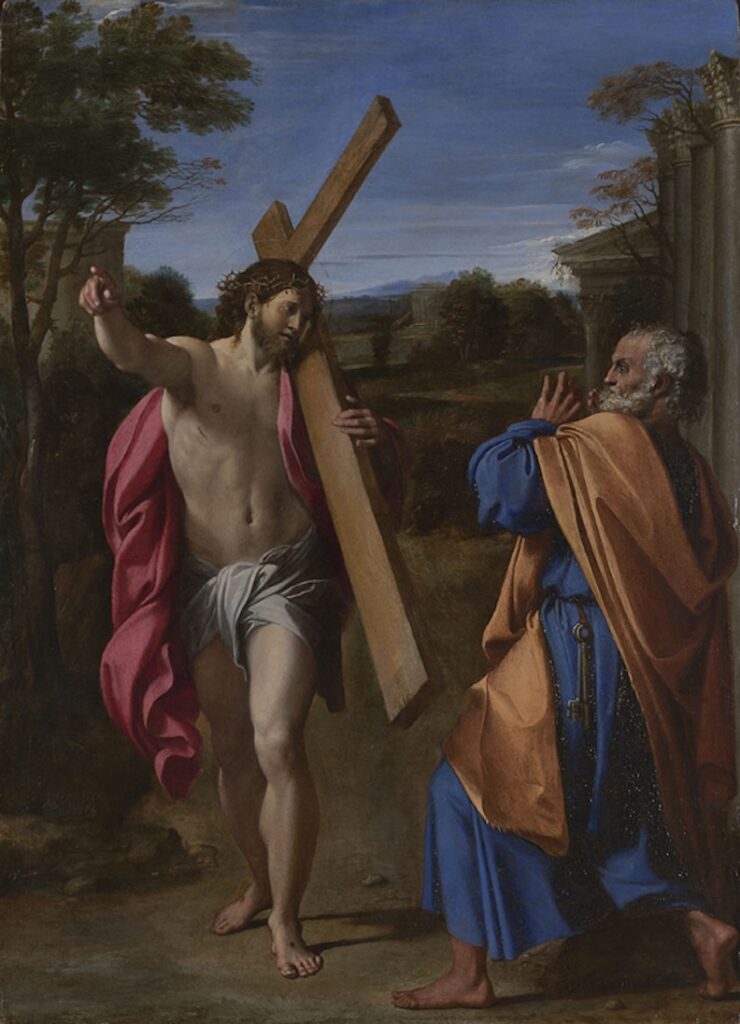In Jane Austen’s Pride and Prejudice, the Bennett family faces the gravest of circumstances when their youngest daughter, Lydia, runs off with the wicked George Wickham. Although the situation is eventually made far less grave than first thought, with Lydia and Wickham marrying, few of the Bennetts’ neighbors were willing to condole with the family during their dark trial. But then the Bennetts’ fortunes take a dramatic turn. The family that was the least envied in the county becomes its most illustrious with the marriage of their other two eldest daughters to men of great fortune. For the Bennett Family, shame’s pendulum swung wildly in the opposite direction, stirring up praise, approbation, and even envy among their neighbors.
As we journey through Holy Week, the reversal of fortunes of Our Savior, from ignominious death to glorious resurrection, couldn’t be more stark. Jesus of Nazareth takes on the deepest scourge the Roman Empire could inflict, with nothing considered too brutal or shameful. Through it all, He was abandoned by those closest to Him, save a few holy women and the beloved disciple. But then, after days of silence, we are given the hope-filled image of the Magdalene, cold and trembling in the early morning hours, asking the gardener where he has put her Lord.
No one envies others in pain and crisis. Compassion is often the best we can do, a word that means to suffer with someone. Human nature usually takes a different tack. Most of us recoil from suffering, trying to find ways to soften, or even escape it. There is a kind of fear that any connection might bring pain to us too. Everyone likes glory, power, and might, but few are willing to travel through the dark, ugly, desolate space required not just to get them, but to be worthy of them as well.
It is hard to imagine anyone being envious of Christ and His violent and bloody death. Most – even of those closest to Him – ran. Fr. Dolindo Ruotolo said of Jesus, “We might say that He wanted to show Himself in action and in suffering, that man might not envy His greatness and His eternal happiness.” People knew what it took to get to His kingdom. His authority and greatness are hidden in His bloodied and scourged body. And yet, that is the door through which He gladly passed for us. His model, the one from which most of us shrink and shirk, is the key. We all must go through it.
Envy today is a powerful cultural engine. It seems to be everywhere. Political systems and ideologies are structured around it. Relationships are destroyed by it. And much that has been built up has been torn down by its ruinous hands. Envy wants to grasp at privilege and status, but suffering scatters it. The leper, the hemorrhaging woman, the family with a fallen reputation, stimulate the envious to find something more pleasing.
Christ and His saints have redeemed suffering, not to make it disappear, but to reveal it as the hidden way. The Christian life, which is so under attack today, is rejected because it requires us to lay down our lives for others; to die to self; to be like the grain of wheat that must be broken open for new life to emerge. Such concepts, which can feel all too familiar, trite, and clichéd, are restored and resonate in us when we see them lived out. When we see people sacrifice for us or for others.

The married couple knows it, as they navigate and negotiate personal differences and worldly challenges together.
The mother is keenly aware of it in her long labor to deliver a child and the longer labor to raise him to adulthood.
The father feels it as he endures arduous work, long hours, or challenging colleagues to provide for his family.
The priest knows it when he sacrifices personal intimacy to open the way for spiritual intimacy.
The nun knows it who rejects a worldly spouse for the supernatural.
And single men and women know it, as they discern the not yet, or the not meant to be, of their future.
These kinds of dying to self used to be the understood cadence of life when the Christian ethos permeated the culture. Christ’s model of humility and surrender were understood, even if not on a deep level, to be the avenues to bring about life, flourishing, and community. Pain was never about the pain itself, but pain with a purpose, pain that could be transformed dramatically into something bigger and beyond our wildest imaginings.
It’s no accident that our culture – which flees from pain at any opportunity while trying to cloak itself in safety, comfort, and pleasure – rejects the denial of self. We see the decadence ever encroaching around us as the culture of pleasure and independence grows stronger and more entrenched. We can be assured that the envious will not come after us or seek us out in our misery. They will most likely leave us to build anew and afresh, quietly and in insolation.
Few who experienced Christ’s Crucifixion, or who ran from it, could have ever imagined the glory of His Resurrection. This Holy Week, may we not run from the Cross and the crosses in our lives, but we know that the new life we are promised is not some future vague and inarticulate something, but that our suffering has the power to transform us in ways we cannot begin to imagine, both here on earth and hereafter.















